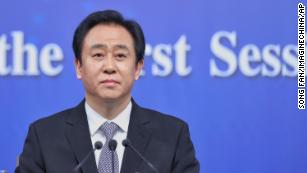Hong Kong (CNN Business) Evergrande, the embattled Chinese property developer, has defaulted on its debt, according to Fitch Ratings.
The credit ratings agency on Thursday downgraded the company and its subsidiaries to "restricted default," meaning that the firm has failed to meet its financial obligations.
Fitch said the downgrade reflects the company's inability to pay interest due earlier this week on two dollar-denominated bonds. The payments were due a month ago, and grace periods lapsed Monday.
Fitch noted that Evergrande made no announcement about the payments, nor did it respond to inquiries from the ratings agency. "We are therefore
Evergrande has about $300 billion in total liabilities, and analysts have worried for months about whether a default could trigger a wider crisis in China's property market, hurting homeowners and the broader financial system. The US Federal Reserve warned last month that trouble in Chinese real estate could damage the global economy.
Evergrande did not immediately respond to a request from CNN Business for comment. However, the company had warned this may be coming. In a stock exchange filing last Friday, it said it might not have enough funds to meet its financial obligations. At that time, it said it was planning to "actively engage" with offshore creditors on a restructuring plan.
Evergrande's billionaire founder has been bailing out the business. That can't continue
In another filing Monday, the company said it would set up a risk management committee that would be headed by Evergrande's chairman and founder Xu Jiayin to focus on "mitigating and eliminating" future risks.
Fears of default sent shares of Evergrande plummeting 20% on Monday. So far this year, the stock has lost 87%.
The company had been scrambling for months to raise cash to repay lenders, and Xu has even been selling off personal assets to prop up its finances. It previously appeared to avoid default on any of its offshore bonds by paying overdue interest before their grace periods expired. Now, though, that streak has ended.
Another credit ratings agency, S&P, said earlier this week that "default looks inevitable for Evergrande" with repayments of $3.5 billion on US-dollar denominated bonds due in the coming months.
"The issuer [Evergrande] does not seem to be making much progress in resuming construction, given its difficulties in raising new financing," S&P Global analysts wrote in a note published Monday.
Chinese authorities have been trying to contain the fallout. Last Friday, the local government in Guangdong province, where Evergrande is based, said it would send a working group to Evergrande to oversee risk management, strengthen internal controls and maintain normal operations, at the request of the company.
The People's Bank of China and other top financial regulators have tried to reassure the public that Evergrande's problems can be contained. The central bank on Monday also announced that it would pump $188 billion into the economy, apparently to counter the real estate slump.
"The rights of shareholders and creditors of Evergrande will be fully respected in accordance to their legal seniority," PBOC governor Yi Gang said Thursday in a video speech to a Hong Kong forum, according to the central bank.
But other Chinese developers are also in trouble. On Thursday, Fitch downgraded the Kaisa Group to "restricted default."
No comments:
Post a Comment